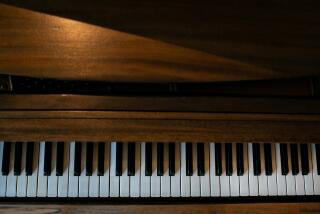‘Set Chopin Free’ Kickstarter campaign surpasses its goal
Chopin is free.
His freedom -- technically his music’s freedom -- comes courtesy of composer Aaron Dunn’s Kickstarter campaign: Raise $75,000 to record the complete works of the 19th century Polish romantic composer and offer them on Dunn’s open culture website Musopen, to be enjoyed anytime and free of copyright.
By Thursday, with 31 days still remaining in the campaign, Dunn had surpassed the goal: 1,823 backers have pledged $76,364.
CHEAT SHEET: Fall arts preview
The music of Frédéric Chopin – every nocturne, prelude, waltz, polonaise, mazurka and etude – will now be in the public domain.
Observing Chopin’s 200th birthday in 2010, Dunn conceived an ambitious project: Raise money with a Kickstarter campaign to hire a professional orchestra to record the 245 works of Chopin and make them available on Musopen to anyone who might want a moment of Chopin in his or her life.
The origins of the project lie in Dunn’s formative experience in the halls of higher learning. “I saw trash bags of recordings I’d made in the Skidmore College orchestra just being thrown out,” he remembers, “because there was just nothing to do with them.” That senseless loss led him to launch Musopen, an online library of music and recordings that he likens to a “Wikipedia for music.”
When online crowdfunding engine Kickstarter began in 2009 and quickly gained popularity, Dunn saw an opportunity and unveiled Musopen’s first Kickstarter campaign: to record and release the Beethoven, Brahms, Sibelius, and Tchaikovsky symphonies for free and without the restriction of copyright.
PHOTOS: Arts and culture in pictures by The Times
An unqualified success, 1,276 backers pledged more than $68,000 – well above Musopen’s original goal of $11,000.
Brand-name orchestras don’t come cheaply. “We actually have to pay for names, oddly enough,” he says, adding somewhat cryptically, “so I can’t say the name of the orchestra that recorded those first classical pieces from the first Kickstarter, but members of the Czech Philharmonic Orchestra were involved.”
Emboldened, his next project was a pursuit to record the works of Chopin.
“I wanted to do something that would have an ever greater and lasting impact – and that was Chopin. He’s a more manageable composer in terms of the amount of music he’s composed; he has broad appeal.”
And yet with that endeavor comes the reality of where classical music stands today as a consumable unit of culture. “The fundamental assumption we have,” Dunn asserts, “is that people today are essentially used to getting music for free. Classical music probably has a lower young adult audience than ever. Something people are risk-averse to trying has to be free to explore and to try it.”
ART: Can you guess the high price?
As a result of that first Kickstarter, Dunn surveyed his backers and discovered something surprising: that people were pledging more for the principle of the thing than the actual product. “At least 70% said they didn’t listen to classical music. I can only think that they believed in the mission,” he said.
“In terms of drumming up support for this sort of free culture movement, it was a success. This was also a lesson in marketing. The message was originally something classical music-related.”
When this tactic foundered, he raised his aim – successfully so. “Then the message I tested was, ‘Set music free.’”
As for the question of which composer’s works he’d like to liberate next, Dunn hesitates. “I’m actually thinking of a project outside of music,” he says, “because the tricky thing with this music is that if I spent my entire life ‘freeing’ music … well, it wouldn’t happen, anyway. I want to divert my focus more on to music education – to start a composer’s competition to create new music. I want to do more music that’s approachable to people.”
ALSO:
Fall 2013 classical music season picks
Bette Midler bringing Sue Mengers play to Geffen Playhouse
Video: A sneak peek at Placido Domingo and L.A. Opera’s ‘Carmen’
More to Read
The biggest entertainment stories
Get our big stories about Hollywood, film, television, music, arts, culture and more right in your inbox as soon as they publish.
You may occasionally receive promotional content from the Los Angeles Times.






